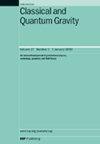For a flat Universe, C P /...
IF 3.6
3区 物理与天体物理
Q2 ASTRONOMY & ASTROPHYSICS
引用次数: 0
Abstract
This paper deals with gravitational thermodynamics on the dynamical apparent horizon of an Friedmann–Lemaitre–Robertson–Walker (FLRW) Universe with dissipation. The dissipation is assumed to arise due to adiabatic gravitational particle creation. For the thermodynamic study, we consider the Bekenstein–Hawking formalism and also assume a nonzero curvature κ for a general study. In particular, we study the unified first law, the generalized second law, and thermodynamic stability in our model. The specific heat capacities are taken into account for the study of thermodynamic stability. Our study reveals a nice result! The ratio of the specific heat capacity at constant pressure and that at constant volume in a flat FLRW Universe with dissipation is nothing but the negative of the deceleration parameter. In classical thermodynamics, this ratio is known as the isentropic expansion factor or (for ideal gases) the adiabatic index. A more interesting fact that has come to light is that this relation is independent of the cosmological model used. So, this is actually a generic result in big bang cosmology. We discuss the implications of this result on the evolution of the Universe. Finally, we determine the constraints on the effective equation of state and the particle creation rate which guarantees thermodynamic stability in our model.对于平坦的宇宙,C P /…
本文研究具有耗散的friedman - lemaitre - robertson - walker (FLRW)宇宙动态视界上的引力热力学。假设耗散是由绝热引力粒子产生引起的。对于热力学研究,我们考虑贝肯斯坦-霍金的形式,并假设一般的研究是非零曲率κ。特别地,我们研究了模型的统一第一定律、广义第二定律和热力学稳定性。在热力学稳定性的研究中考虑了比热容。我们的研究揭示了一个很好的结果!在有耗散的平坦FLRW宇宙中,定压比热容与定容比热容之比就是减速参数的负值。在经典热力学中,这个比率被称为等熵膨胀系数或(对于理想气体)绝热指数。一个更有趣的事实是,这种关系与所使用的宇宙模型无关。所以,这实际上是大爆炸宇宙学的一般结果。我们将讨论这一结果对宇宙演化的影响。最后,我们确定了保证模型热力学稳定性的有效状态方程和粒子产生速率的约束条件。
本文章由计算机程序翻译,如有差异,请以英文原文为准。
求助全文
约1分钟内获得全文
求助全文
来源期刊

Classical and Quantum Gravity
物理-天文与天体物理
CiteScore
7.00
自引率
8.60%
发文量
301
审稿时长
2-4 weeks
期刊介绍:
Classical and Quantum Gravity is an established journal for physicists, mathematicians and cosmologists in the fields of gravitation and the theory of spacetime. The journal is now the acknowledged world leader in classical relativity and all areas of quantum gravity.
 求助内容:
求助内容: 应助结果提醒方式:
应助结果提醒方式:


